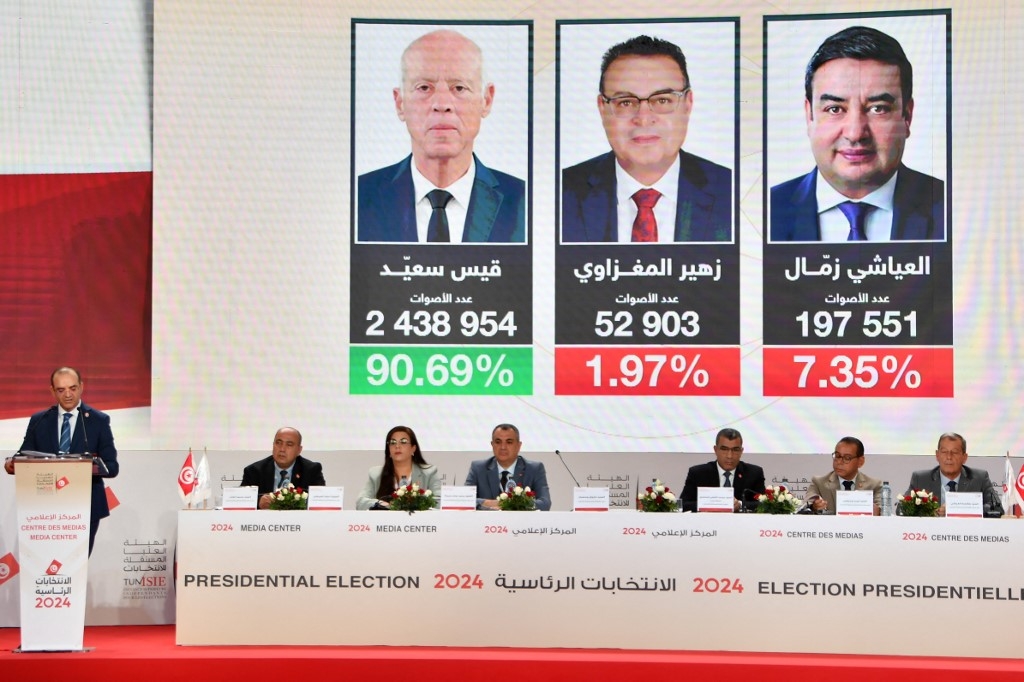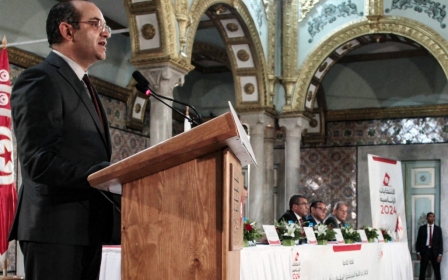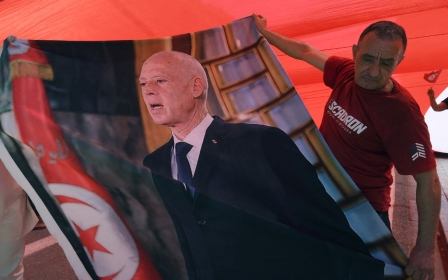'Dictatorship': Saied's landslide re-election results met with doubt by Tunisians

In Tunisia, the result obtained by President Kais Saied in Sunday's presidential election raised eyebrows among many observers, who called the process a "mockery".
Incumbent Saied, accused by the opposition and civil society of authoritarianism, was re-elected with an overwhelming majority of 90.7 percent of ballots in a vote considered a foregone conclusion and rigged by the authorities.
Saied won the votes of just over 2.4 million people out of 9.7 million registered voters, the Independent High Authority for Elections (ISIE) announced on Monday evening.
The election was marked by a record abstention rate. The voter turnout was 28.8 percent, the lowest since the introduction of democracy in 2011, following the ousting of longtime autocrat Zine el-Abidine Ben Ali.
In addition to Saied, only two competitors were allowed to run out of 17 would-be candidates, after the banning of the president's most serious rivals.
New MEE newsletter: Jerusalem Dispatch
Sign up to get the latest insights and analysis on Israel-Palestine, alongside Turkey Unpacked and other MEE newsletters
One of those allowed to run, liberal industrialist Ayachi Zammel, was imprisoned in early September and then sentenced to 12 years in prison on charges of falsifying sponsorships a few days before the vote, which prevented him from running his campaign.
The other candidate, Zouhair Maghzaoui, a former MP from the pan-Arab left, has been a supporter of the sweeping power-grab process initiated by Saied in the summer of 2021, which included dissolving parliament and weakening counterpowers in what opponents have labelled a coup.
Zammel received only 7.35 percent of the vote, while Maghzaoui got only 1.97 percent.
Several Tunisians expressed their discontent on social media over results reminiscent of the dictatorship under Ben Ali.
"Curtain falls on Tunisian democracy," wrote journalist Amine Snoussi. "The authoritarian regime is closing with an electoral parody which results in a poll, broadcast at 8pm on national TV, announcing a victory for the president with 89.2%!"
🇹🇳 Dictature.
— Amine Snoussi (@amin_snoussi) October 7, 2024
L’instance électorale tunisienne crédite Kaïs Saied à 90,69%. C’est la même instance qui a empêché les opposants de se présenter.
Le plus gros score depuis Ben Ali en 2004 avec 94,4%. Le dictateur de l’époque était le seul candidat.. pic.twitter.com/GQynvhb9WF
Translation: "Dictatorship. The Tunisian electoral authority credits Kais Saied with 90.69 percent. This is the same authority that prevented opponents from running. The highest score since Ben Ali in 2004 with 94.4 percent. The dictator of the time was the only candidate.."
"With this result, Tunisia has now officially fallen into the ranks of dictatorial regimes. The thin facade of democracy has been ripped away, exposing the harsh reality of authoritarian rule," wrote activist Mohamed Ali Azaiez.
Others mocked the result, in which the arithmetic sum of the votes obtained by each candidate exceeded 100 percent.
Matteo Trabelsi, a journalist from independent Tunisian media Inkyfada, drew a parallel with neighbouring Algeria, where outgoing President Abdelmadjid Tebboune was re-elected a month ago in a similarly locked-down political context.
#Tunisie 🇹🇳 La très dépendante ISIE vient de confirmer la mascarade électorale élaborée par Kaïs Saïed en lui créditant 90,69% des suffrages exprimés.
— Matteo Trabelsi (@TrabelsiMt) October 7, 2024
Il réalise le meilleur score depuis Ben Ali en 2004, qui était seul.
En Algérie, même Tebboune n’a pas osé en faire autant. pic.twitter.com/jyqsq5tSuD
Translation: "The very dependent ISIE has just confirmed the electoral mockery elaborated by Kais Saied by crediting him with 90.69 percent of the votes cast. He achieved the best score since Ben Ali in 2004, who was alone. In Algeria, even Tebboune did not dare to do the same."
Some social media users also denounced the role played by the international community in Tunisia's autocratic drift, especially the European Union, which is accused of turning a blind eye to Saied's illiberal turn in exchange for his cooperation in preventing migration to Europe.
#Tunisie: le dictateur tunisien aurait été élu avec un score de 89,2% après avoir emprisonné tous les autres candidats !!
— Desertup (@Desertup) October 6, 2024
Les pays occidentaux et notamment ne diront rien car ils préfèrent des dictatures dans ces pays et surtout pas de démocratie ! pic.twitter.com/ShtgOORJcF
Translation: "The Tunisian dictator was reportedly elected with a score of 89.2 percent after imprisoning all the other candidates!! Western countries in particular will not say anything because they prefer dictatorships in these countries and especially not democracy!"
In a statement, the European Union stated it had "taken note" of the criticisms of various NGOs and opponents "concerning the integrity of the electoral process" and "various measures deemed detrimental to the democratic requirements of credibility" of the vote.
The Tunisian NGO I-Watch said on Facebook that it was "not surprised" by the "Stalinist" results.
I-Watch pointed to the lack of transparency in the electoral process, the absence of international observers, but also "the alignment of the 'non' independent high authority for the elections behind" Saeid.
Several Tunisian and foreign NGOs, including Human Rights Watch, have accused the ISIE of "having lost its independence" and an electoral process "distorted in favour of Saied".
In early September, the Isie refused to comply with an administrative court decision ordering the reinstatement of three candidates considered as serious rivals for Saied.
And a week before the vote, parliament, seen as a tool for Saeid since his takeover, approved a law that strips the administrative court of its power to rule on election-related disputes, a move decried as anti-democratic just days before the ballot.
In its statement, I-Watch denounced "the involvement of the [MPs] in paving the way for the president's victory without serious competition or accountability by amending the electoral law a week before election day".
According to Tunisia’s electoral commission, Saied won with 90.7% of the votes.
— Mohamed Dhia Hammami - محمد ضياء الهمامي (@MedDhiaH) October 8, 2024
An «any gratuitous accusation against the Election Authority of fraud or falsification of results, whether explicitly stated or implied, will be legally examined and referred to the Public… pic.twitter.com/RXVvP01smq
Several parties called for a boycott of a vote. Rejecting the electoral process as a whole, the Workers' Party, led by left-winger Hamma Hammami, called it a "farce".
"The power resulting from the coup d'etat has received a slap in the face from the Tunisian people. Regardless of the credibility of the preliminary figures announced by the ISIE, they are enough to confirm the popular failure of this farce.
"The abstention rate, which exceeded 70 percent, means that the vast majority of voters boycotted this farce for various reasons," the party said in a statement published on Monday evening.
Upon the annoucement of the results, Zammel's campaign said that the defeated candidate called on "the elected president of the republic and the national opposition to prioritise the higher national interest and to establish a political truce," as well as to release "all prisoners detained because of their political, media, economic or artistic activities".
Since spring 2023, more than 20 of Saied's opponents, including Rached Ghannouchi, leader of Tunisia's largest opposition party Ennahda, and Abir Moussi, chairwoman of the Free Destourian Party (PDL), have been imprisoned.
In recent months, trade unionists, lawyers, political columnists and defenders of migrants' rights have also been jailed.
Observers now fear fresh crackdowns. According to Michael Bechir Ayari, Tunisia specialist at the International Crisis Group, there is a "risk of an acceleration in internal repression".
Middle East Eye delivers independent and unrivalled coverage and analysis of the Middle East, North Africa and beyond. To learn more about republishing this content and the associated fees, please fill out this form. More about MEE can be found here.




